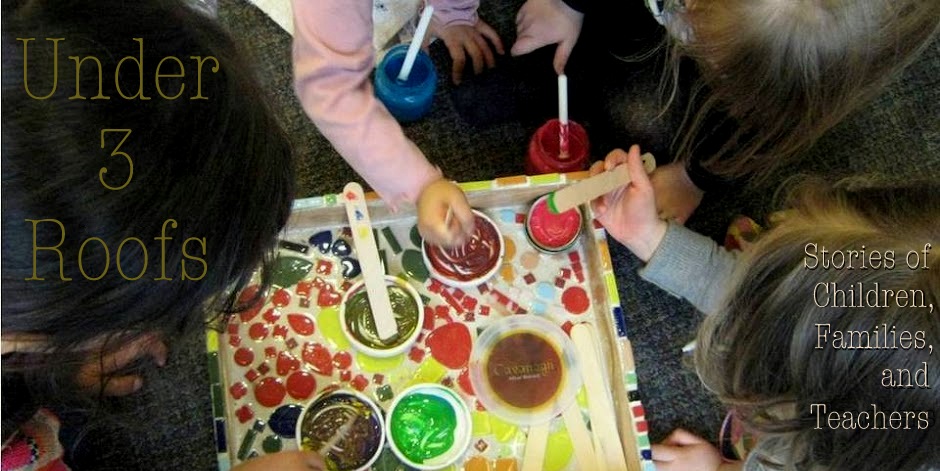Last Wednesday, we welcomed fifty educators as part of Boston Area Reggio Inspired Network’s 2017 series. We reflected upon how we’ve brought liberatory teaching into our own practice, and planned strategic next steps using Margaret Carr’s structured view of learning dispositions.
Learning Dispositions are “situated learning strategies plus motivation”.
-Margaret Carr, Learning Stories; Assessments in Early Childhood
Teaching and learning are situated within a specific group of people with a variety of identities and within our larger contexts; our classrooms, communities, nation and world. Anti-bias teaching starts out haphazard and ad hoc sometimes but before long we realize our work must be strategic to stay accountable to our goals. We are motivated to do this learning and teaching by its obvious urgency; children’s worldview, culture and safety can be at stake.
“Becoming is better than being”
Carol Dweck’s “process goals” and “performance goals” describe two different approaches to learning, and it is crucial that we are not perfectionists in the work of education for freedom. Dweck researches learners’ orientations to errors and other challenges. Learners with “performance goals” and a fixed mindset want to get it just right without effort. They want to “be” smart or strong, but dislike making mistakes, and feel uncomfortable with the struggle it takes to “become” smart or strong. “Process goal” learners have a growth mindset and seem to enjoy struggle, and recognize that good outcomes; the right answer, for example, or a new skill, come out of hard work and mistakes. They are willing to do what is needed to “become” better.
We can’t wait for anti-bias education until we are ready, worry about achievement or get it right the first time. We can only counter bias through the invaluable process of becoming more knowledgeable, more open, more awake, more willing to act and move through our errors with humility. Because biases and unfairness are in the world, they are in our classroom and in us. We will struggle and we must be ready to listen when folks tell us that we’ve made mistakes.
We need a view of learning that sees “development as the transformation of participation” (Carr, again, naturally). These domains take a process orientation for granted and measure that process through a narrative built of observations.
She identifies five domains of a learning disposition:
Taking an Interest,
Getting Involved,
Persisting with Challenge or Uncertainty,
Expressing thoughts and feelings and
Taking Responsibility.
These domains are a perfect way for us to understand our own growth as teachers for liberation.
Getting Involved,
Persisting with Challenge or Uncertainty,
Expressing thoughts and feelings and
Taking Responsibility.
These domains are a perfect way for us to understand our own growth as teachers for liberation.
Learning from History
Many years ago, I asked our mostly white staff to self-identify; whether they knew nothing, something or were experts about anti-bias curriculum. Everyone RAN over to the “experts” part of the spectrum. (I didn’t know what I didn’t know about people’s poor ability to accurately appraise themselves about things they don’t know much about, and I underestimated the personal drama of being asked to do it publicly.) People in the “expert” area explained themselves; “I have an Asian neighbor.” or “I don’t see color.”
These folks were beginners, but they thought they were experts. I learned from my mistake; this time, we used Carr's domains as an objective yardstick to help us figure out what kind of learning we’ve done and what kind we are headed into.
After a short presentation about our collective journey with anti-bias education at Peabody Terrace Children’s Center, we used a protocol to create our individual narratives of engagement with anti bias education and reflect.
Then, we brought in the key element of feedback. We shared our stories with others and they helped us determine which of the learning domains we were working within. Finally, well-informed, we identified for ourselves what kinds of actions might help us move forward from where we are.
Domains of Learning Dispositions:
Learners taking an interest are developing:
|
|
Learners getting involved are developing:
|
|
Learners persisting with difficulty or uncertainty are developing:
|
|
Learners communicating with others are developing:
|
|
Learners taking responsibility are developing:
|
|
(Adapted from table 2.1, in Margaret Carr’s Assessment in Early Childhood Settings: Learning Stories)
As someone who thinks not only about individual development, but also about how our organization grows and changes, these domains also helped me to see which domain our center is exploring. We have firmly established interest, involvement, persistence and communication about anti-bias teaching. We are on the edge of taking responsibility; this is our next frontier. This framework takes for granted a "growth mindset" and in situating teachers' development within the realm of learning dispositions, it is my hope that teachers work to let go of their hangups that come with performance goals.
Does this structure help with some of the feelings of unsettledness, inertia, or hopelessness that sometimes accompany this work?
How could we use this way of understanding with families?
